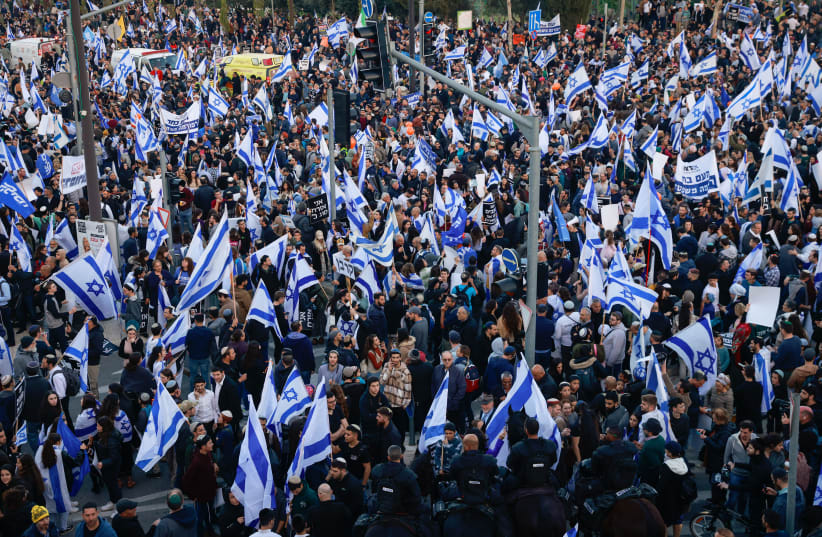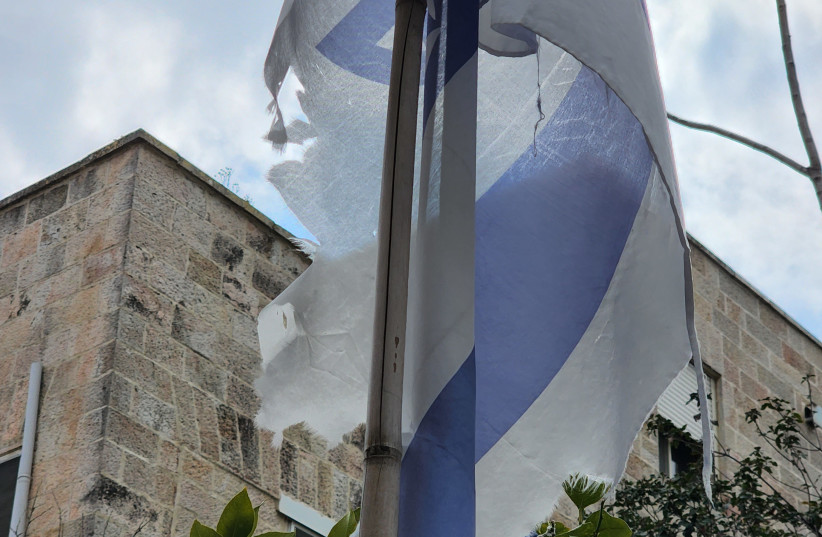I love walking home, flag in hand, from the weekly demonstrations outside the President’s Residence in Jerusalem, after being engulfed in a sea of blue and white.
There is a sense of patriotism anew in Israel that is wide and deep, albeit tattered and worried.
My daughter Hallel, on the front lines of the protests in Tel Aviv, described a recent scene in which the La Familia pro-judicial reform gang went nose-to-nose with her and her friends, with both realizing they were clutching the same flags on both sides of the great divide.
My dad is a collector of ancient Israeli coins and oil lamps, as well as Lincoln book-ends and baseball cards of Jewish players. He recently gifted me a copy of a New York Times full-page article from December 10, 1948, with a draft of the proposed constitution of the State of Israel.
David Ben-Gurion 75 years ago decided to punt the potentially divisive question of a constitution to future generations, since he probably had to do everything possible to keep the Jewish people united and win the War of Independence.
Fighting Israel's second War of Independence
The younger generation here describes the protests as the Second War of Independence of the State of Israel. We have inherited the question of the constitution, which is ultimately the best solution that can come out of this yet another frightening but potentially transformative inflection point in the sweep of our 4,000-year history.
I was recently boarding a flight with Eric Fingerhut, the CEO of the Jewish Federations of North America, which is sending large delegations to celebrate with us Israel’s 75th – a landmark birthday. While much has been made of the fact that the first commonwealth in Israel, under kings David and Solomon, only lasted about 75 years until the kingdom was split by internal divisions, Eric pointed out an American corollary: From the writing of the US Constitution – which did not outlaw slavery but stated that “all men are created equal” – to the bloody Civil War to end slavery was about 75 years.
So when President Isaac Herzog warns that Israel is on the verge of a civil war, to my American-grown ears, my fears sometimes overwhelm my hopes. But then my wife and I return to the demonstrations – flags in hand – and realize again how powerful civil society is, and how loyal vast numbers of Israelis and our allies around the world are to the letter and spirit of Israel’s inspired Declaration of Independence. We return home energized, and so should world Jewry. We know that David Ben-Gurion would be marching with us, in protest and in celebration.
As someone who was a leader of the Soviet Jewry movement, our goal was to support the courageous people behind the Iron Curtain. We knew that being a dissident could be a lonely and isolating experience, and our goal was to make sure – as Natan Sharansky titled his new book with Gil Troy – for them to feel “never alone.” Yet to be a dissident in Israel is not an individual act of courage, like it was in the USSR, but a collective, historic movement of the re-affirmation of enlightened Zionist ideas and principles.
When I hear of friends or acquaintances in Jewish communities around the world for whom the ascension of extremists to key government posts here was the last straw in having a positive relationship with Israel, I am heartbroken for their loss. They are missing out on a great struggle for the soul of the Jewish people and the Jewish state and now sit it out because they don’t like the other side or the current government. Join the club; most Israelis don’t like our extremists or current government, either. So join us, partner with us, support us, strengthen us, pray for us, invest in us, donate to us, stand with us. One of the great experiences for me in the current crisis was standing with Israelis and local Jews in Boston outside the State House in Boston Commons with Israeli flags and in solidarity with those in the streets of the Holy Land.
I have stood with my fellow dissidents holding the Israeli flag in Jerusalem, Boston and even twice along the Eilat highway outside Kibbutz Ketura. The first time we stood on the Arava road, there was little reaction from the holiday drivers. More recently, about a third of the cars speeding by honked their approval, including even Egged bus drivers.
Young progressive Jews around the world don’t understand the significance of the soul battle happening at this very moment nor the importance of the Egged bus driver honks, which, like the military reservists and pilots dissenting, means we have already won the battle on the eve of Israel’s 75th but not yet the war over Israel’s future. This 75th, to celebrate the dissidents is to celebrate the inspired spirit of Israel’s Declaration of Independence, all while also holding the brokenness and imperfections that are glaring. Once we win this war, Israeli society will return shortly and more empowered to address the difficult issues of equality of all our citizens, the great social and economic gaps, the gas monopoly that is a toxic carbon-bomb, and relations with our Palestinian and other neighbors.
It is no small achievement to perhaps be the only indigenous people to successfully return to our native land and establish sovereignty. We also didn’t enter the Promised Land in the Bible or in our day a perfect people but instead as a struggling people with a good story and both universal and particular values that are a gift. The sense of betrayal that I hear in the voice of especially young progressive Jews is, on the one hand, understandable; and, on the other hand, lacks fundamental historical and theological judgment and perspective.
The most betrayed figure in Jewish life is God, followed by Moses. As we count the 49 days from Egypt to Mount Sinai, our tradition links the defining intervention of God in Jewish history – the Exodus – with the painful betrayal by the Israelites of the very God and His prophet who just redeemed them. The Israelites dance around the Golden Calf; Moses smashes the tablets at the foot of Mount Sinai and then pleads before God not to annihilate this “stiff-necked people.”
“Now, let Me be, that My anger may blaze forth against them and that I may destroy them” (Exodus 32:10), bellows the Master of the Universe.
The Israelites, who had witnessed the 10 plagues and the parting of the Red Sea, lost faith so quickly. (They, in 49 days; we, in 75 years?) So each year on Passover, we reinforce this historic memory into our people, to restore our faith by coming together. Historic amnesia only serves the tyrants.
One of the song lines most quoted at the democracy rallies recently in Israel is “We made it past Pharaoh, we will make it through this.”
Moses helps God pivot, reminding God of the covenant with the founding fathers of the Jewish people and also the humiliating prospect of the ridicule of the Egyptians for God having freed the slaves to only slaughter them. And Moses inscribes a second set of tablets of the law, which accompany the Israelites in the desert and to the holy of holies in Jerusalem, to the very spot where the riots during Ramadan have further challenged a dysfunctional government and many people’s ability to identify with Israel in a positive light.
In the Talmud, we learn that the first set of broken tablets are also sacred, and we have something to learn from them as well.
“Rabbi Yehoshua ben Levi further advised: And be careful to continue to respect an elder who has forgotten his Torah knowledge due to circumstances beyond his control. Even though he is no longer a Torah scholar, he must still be respected for the Torah that he once possessed. As we say: Both the tablets of the Covenant and the broken tablets are placed in the Ark of the Covenant in the Temple. Even though the first tablets were broken, their sanctity obligates one not to treat them with contempt. An elder who forgot the Torah knowledge he once possessed is likened to these broken tablets” (Brachot 8b).
What is true for the broken tablets of Moses is true in our day for our tattered flag. Yes, its techelet color is fading, its corners ripped, its fabric fraying. But we must embrace it and march with it, along with our new dark-blue and clean white flags that have come to symbolize the current generation’s rejuvenation of the Jewish people in our ancient homeland.
When the dissidents are the majority and yet the government has a Knesset majority, how do we celebrate Israel’s 75th with integrity?
Abraham Joshua Heschel’s answer to the question about joining the civil rights protests on Shabbat – “we pray with our feet” – links the unresolved constitutional issues of the US founding fathers with the movement in Israel to finally establish one. We celebrate with our feet, our flags and our dreams, old and new. Until we win. ■
The writer, a Young Judaean who made aliyah with his family 17 years ago, is a former chairperson of the World Union of Jewish Students and a climate impact investor and activist. He can be followed @Kaptainsunshine

